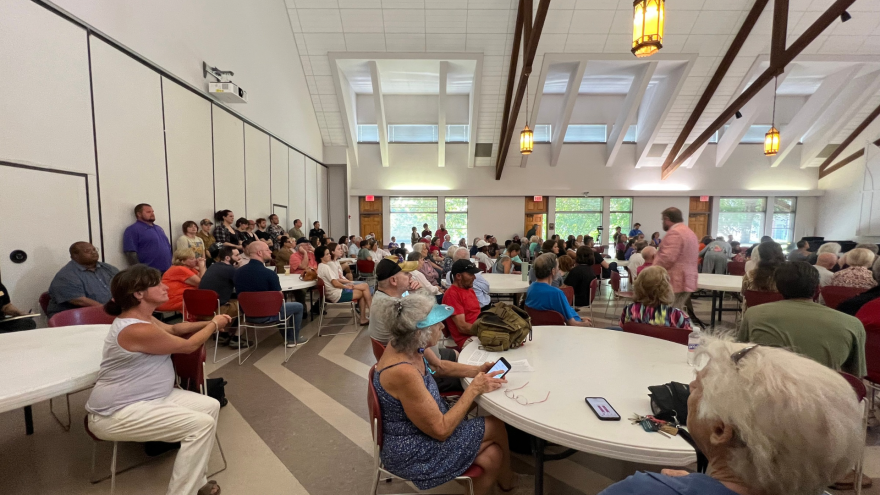Angela Norris goes by Angie. She's originally from Madison County. For about a year, she’s been in and out of homelessness in Fayetteville. She’s lived on the 19th Street property for the past eight months with her three dogs, alongside friends she now considers family. Recently, she was displaced by a sweep and forced to move further outside Fayetteville. Without a legal place to stay, she and her friends must hide in rural areas.
“By pushing us out, people are further and further away from easy access to medical care,” Norris said. “If something were to happen. So if something happens and somebody has a bad reaction or ends up having a heat stroke or a heart attack because of the heat out here, they have no way to get help. And then the EMS, they have trouble finding us because we're so far out and so far or so remote. Yeah. And where we're at, they don't know of. Those deaths are… It's on them. It's on the city. This could be prevented.”
How did Norris get here, so far from resources?
At the end of May, University of Arkansas police delivered a letter to a camp of unhoused individuals on U of A property on 19th Street in south Fayetteville. The forested encampment sat directly across from New Beginnings Homeless Shelter and close to the 7Hills Day Center. An estimated 80 residents were told to gather their belongings and evacuate before June 9.
The Salvation Army of Northwest Arkansas was referenced as a resource in the letter, but the organization was not made aware of the sweep before UAPD officers distributed the papers. Volunteers with the Salvation Army, who regularly visited the camp, provided the estimate, but confirming it exactly is difficult. Ozarks at Large contacted 7Hills, but they did not respond to requests for comment.
Several grassroots groups supporting Fayetteville’s unhoused were alerted to the university’s letter by residents, including MayDay NWA, which feeds the homeless community weekly at Walker Park. In response, a coalition called Fayetteville’s Forgotten formed to expand assistance. Walker Morris is a member.
“There's a lot of groups, MayDay being the biggest one, that they do feed these neighbors down here and are very much in tune with what's happening and what's going on,” Morris said. “And one of my really good friends let me know that the sweep was occurring, and that a group might be forming to help combat this in any form that we could. And at that point, that's when Fayetteville's Forgotten started forming. We had our first meeting and then we started game planning. How do we start working on solutions when this is coming up so quick?”
Fayetteville’s Forgotten brought attention to the sweep via social media and quickly organized with New Beginnings, the Salvation Army of Northwest Arkansas and other community volunteers to help people move safely. The night before June 9, Fayetteville Mayor Molly Rawn held a community conversation at St. Paul’s Episcopal Church. More than 100 unhoused individuals, formerly homeless residents and advocates like Fayetteville’s Forgotten attended. Many argued the timeline was too short and urged the city to find a solution.

“We, as community members that were helping our unhoused neighbors that whole week, we were wanting solutions,” Norris said. “We were wanting answers. And I know the mayor, she does have her hands tied in some regard. But to hold the town hall the day before the sweep was going to occur and to provide no solutions whatsoever, it was very demoralizing. And it really did impact our day as well, because Sunday was the most important day for us to relocate people safely, because initially people were told they were going to be arrested on the ninth. So that was our expectation as community members is we need to get people out of here safely or the cops show up, they might get arrested. So it really was frustrating to know that a lot of our day was wasted, to try to get people up there, to have their voices heard, then just be told, ‘Okay, go home,’ and now there's no safe place to go either way.”
While some left the meeting feeling unheard, others appreciated the chance to gather. Solomon Burchfield, executive director at New Beginnings, said the gathering was needed.
“It was powerful to hear so many unsheltered folks show up, tell their stories, talk about the hardships and the suffering and how challenging it is to move from homeless to housed,” Burchfield said. “I really thought it was a powerful event, so I loved that we had that event. I thought folks that are unsheltered felt very empowered, being able to tell their stories and push for change. And to me, it's the opportunity to focus on solutions. Some solutions are stopgaps that just help us get through this period of crisis, and then some solutions are long term.”
On the morning of June 9, university and Fayetteville police carried out a “soft sweep” of the property. John Thomas, director of media relations at U of A, said officers walked the area to remind anyone still there to gather belongings and leave. He said officers encountered fewer than two dozen people, all of whom were “cooperative and understanding.” Stephanie Chastaine, public relations and volunteer coordinator at the Salvation Army of Northwest Arkansas, said her volunteers estimated they helped closer to 30 people that day.
“We have a men's group that has been going out bi-weekly to that site,” Chastaine said. “They wanted to take some food out to help people move, kind of try and make connections where they could, and see individuals that they had started to build relationships with.”
Sitting near her camp, Norris wasn’t feeling understanding. She was feeling hopeless.
“We're at loss,” Norris said. “Like all these people out here. They've left their tents behind. They've left so much behind because they don't have the ability to move it, and they don't have the money to go out and buy a new tent. So a lot of people are going to be sleeping under bridges. Yeah, they were out here at 7:30 a.m. We got told they weren't going to be out here until 10 a.m. It was not just university; it was Fayetteville PD. It was detectives. It was what they said was their crisis response team. And all we got handed was a piece of paper, a little pamphlet with a few places that might give out food or clothing or stuff like that, but nothing that's going to guarantee us any real help.”
Organizations like New Beginnings do offer shelter and safety for some, but capacity and rules limit how many can stay, and not all are willing or able to comply. Plus, space is full. Chastaine said beds typically open in spring when weather improves, but this year they’ve been filled for months.
“Unfortunately, we have remained either close to capacity or at full capacity almost all year long, which is highly unusual for us,” Chastaine said. “We usually see a dip in the spring and the fall months when it's really nice outside. We tend to remain more full during the cold winter months and the very warm summer months, but we've remained very full this year, so unfortunately we couldn't really accommodate the 80 individuals that were displaced by this overnight.”
Overnight camping on public land—or on private property without a conditional-use permit—in Fayetteville is illegal. With all shelter beds full and no legal space, Norris must move outside city limits to sleep.
“Even our own city and government officials don't know where to put us,” Norris said. “They want to kick us all out of this property, but can't tell us where to go or where we would be okay to go, or where they would designate that we could be okay to go. And people are breaking down because there's nothing out here for us. And now you've got all of us moving and nobody knows. Nobody knows where to go. Nobody knows what to do. People are gonna end up getting arrested.”
That urgency, mentioned in the June 8 community conversation, prompted Ward 2 Councilmember Sarah Moore to introduce a one -year “Safe Camping Initiative.” Though she’s worked on housing issues since taking office, this resolution was a direct response to the displacement of people like Norris.
“And really, for me, hearing 19th Street, it was more knowing that there are more unhoused individuals just because I deal with them on a daily basis,” Councilmember Moore said. “You know, I encounter folks and walk that with them, you know, whenever they potentially are going in and out of our local detention center through their criminal legal system. And seeing them kind of mired in those stresses. And so knowing some of those difficulties that individuals are facing, knowing that just having to seek out and find where you can feel safe or what you call home is such a rooted, important thing for individuals to have any level of stability to really build from and to stabilize and to move forward in their lives. So it really propelled me. I really did a lot of listening to the community. I kept hearing individuals saying that they would like to have someplace safe. And so that's really the solution that I brought forward, to just open the conversation about some kind of short term quick solution while we work on the mid and long term solutions.”
Using $630,000 in city funds, Moore said the camp would offer 40 beds, 24/7 security and access to laundry and trash services. She cited safe camps and shelters in other cities as inspiration.
On Tuesday night, the Fayetteville City Council met to vote on the resolution. Before the meeting, Fayetteville’s Forgotten held a demonstration outside City Hall with advocates supporting the safe camp. Dozens of other Fayetteville residents, including unhoused individuals and people displaced by the 19th Street sweep, offered public comment in its favor, including Norris.
Only one citizen spoke in opposition, citing safety concerns about the camp’s location. In the days before the vote, 7Hills Homeless Shelter released a statement opposing the camp, saying the city needs “real solutions beyond temporary encampments.” 7Hills CEO Becci Sission attended the meeting but did not speak during the public comment period and did not respond to requests for comment on this story.
The council voted 5–3 against the safe camp resolution. Opponents cited unclear funding uses, security and staffing concerns, past failures of city-led camps, and the need for long-term solutions. Many also felt Fayetteville cannot continue funding homelessness efforts without a broader regional strategy.
Homelessness is a complex, multifaceted issue. The University of Arkansas cited crime as the reason for the sweep, but Solomon Burchfield of New Beginnings said that should not be the only factor.
“It's well documented that crime is a problem in large, unsupported encampments, but people without housing are much more likely to be the victim of a crime than the perpetrator of a crime,” Burchfield said. “That's why leaving people unsheltered is so dangerous. So crime is absolutely one motivation to try to do better than just leaving people camping in the woods without support. And so what is that better? And I think we can come up with a safe alternative that's legal and then do even better than that and get everybody home.”
In the past five years, Fayetteville’s population has grown rapidly alongside University of Arkansas enrollment. The city has repeatedly recognized its housing shortage and made several attempts to address it since before the COVID ‑19 pandemic. Despite this, Fayetteville’s 2025 Housing Assessment shows the gap between income and rent continues to widen—more than half of resident households still need housing priced below average rent. Walker Morris of Fayetteville’s Forgotten warns that if the issue remains unaddressed, everyone could feel the consequences.
“And when you simply go out there and start talking to these individuals, you simply hear their stories, you start to understand,” Morris said. “I could easily be in this position as well. And I think that's the thing that people need to realize is that one little thing could happen to cause you to be in the same position, and you would be thinking, ‘Man, I wish people were helping me out’. So it shouldn't come to the point where I'm in that position to think that I should think these people matter, and anybody here could be a part of this population and we have to start working on solutions. So this doesn't keep happening because you talk to any person out there. They say we see new faces daily and homelessness is not going away. It's getting worse.”
In addition to Moore’s initiative, Mayor Rawn announced plans to hire a chief housing officer, appoint a housing task force and pursue a regional homeless response. A Fayetteville Renters Council was tabled for later. Moore said she was disappointed with the council vote but hopes to see immediate action from the mayor's task force.
“You know, it was discouraging and disappointing to not be able to see us lean into having funding available, knowing that our mayor's administration has stated that they are ready to proceed and move forward by forming a task force, by getting additional staffing in place,” Councilmember Moore said. “We know that ultimately, it's going to take money to be able to solve and create any solutions. And so creating any impediments to them moving forward. Having immediate access to funds to me is unnecessary. The mayor stated they were going to announce the makeup of the task force, but I haven't seen that officially come out.”
Thomas said the University of Arkansas is now assessing next steps for the 19th Street property, including cleaning it to help law enforcement patrol more safely.
Councilmember Robert Stafford, in his final comments at the meeting, called for a regional approach that includes the university.
“They're the ones that put us in this current crisis. They're also adding to our housing crisis, and they just seem to not engage with us in solutions.”
Burchfield, who attended the meeting to speak in favor of the initiative, was at a loss afterward.
“I don't have the words quite yet, to be honest,” Burchfield said. “I mean, a lot of people are going to be sleeping in the rain tonight and lose faith in our leaders. I think there was a lot of back and forth. I still think there's hope to get some people on the right side of a yes, I do think that, but I don't think that they're taking it. They're not treating it as a crisis. Not yet.”
Norris said she’ll keep fighting for change—but for now, it remains illegal for her to exist in Fayetteville.
“You know the mayor, she seems like she really cares,” Norris said. “But it's the city council that's shooting her down because they're more concerned about the money issue. They don't care about those people. They don't. They don't care. It's all money. To them. We're nothing but a paycheck. Well, guess what? You're going to learn my name. You're going to learn my face. I'm not stopping, you know, I'm not stopping.”












